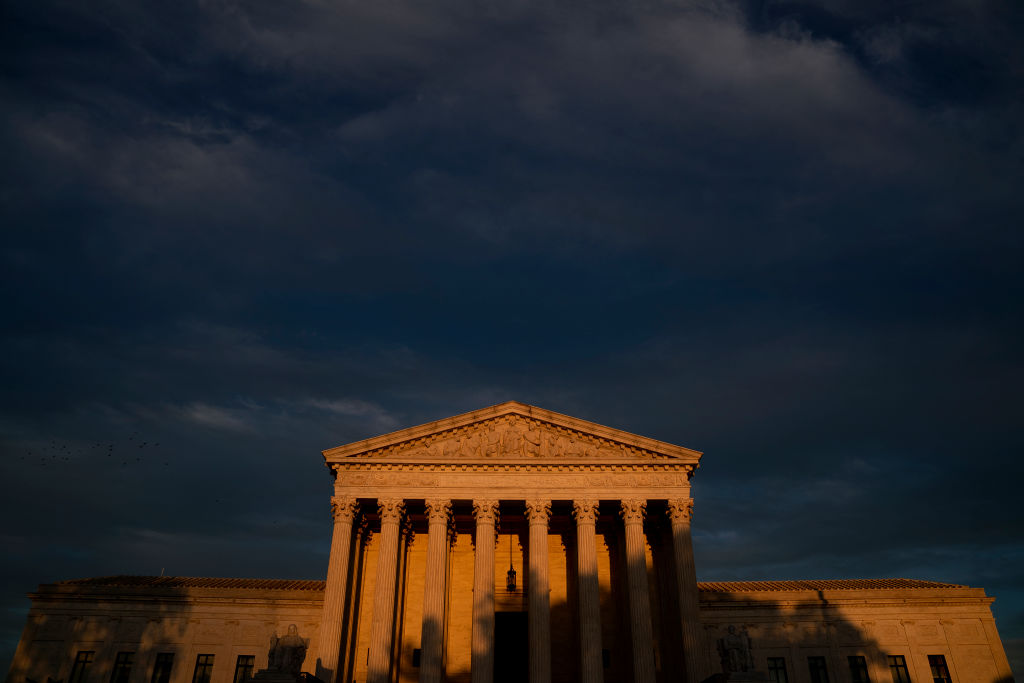The Texas abortion law's broader challenge for the Supreme Court


A free daily email with the biggest news stories of the day – and the best features from TheWeek.com
You are now subscribed
Your newsletter sign-up was successful
Texas' draconian new abortion law — and the Supreme Court's decision to allow it to go into effect — immediately sparked outrage from lawmakers, activists, and regular Americans alike, arguing such a ban was effectively an attack on their rights under Roe v. Wade.
And as the fallout continues, the Supreme Court is now also dealing with a larger, more unexpected challenge while preparing to revisit Roe in the coming months — public trust and confidence in the highest court in the land, writes Jill Filipovic for The Atlantic.
"Few issues stand to undermine public confidence in the Court more than curtailing abortion rights," particularly when those trust levels have already been reported at an all-time low, writes Filipovic. Notably, a "a significant majority of Americans oppose overturning Roe, and fewer than a third say they want the Court to reverse the 1973 decision," she notes.
The Week
Escape your echo chamber. Get the facts behind the news, plus analysis from multiple perspectives.

Sign up for The Week's Free Newsletters
From our morning news briefing to a weekly Good News Newsletter, get the best of The Week delivered directly to your inbox.
From our morning news briefing to a weekly Good News Newsletter, get the best of The Week delivered directly to your inbox.
The decline in public approval and fears of growing partisanship, exacerbated by the handling of the Texas law, have also "encouraged progressives to float the idea of expanding the court—something that had been politically taboo for decades."
"An expanded court would lessen the conservative justices' power; new tenure rules could put some of them out of a job" Filipovic writes.
The nine justices are certainly paying attention to the current optics, as they often have with abortion rights cases — in response to the public anger and expectations, some have embarked on an "extraordinary public display" of defensiveness and irritation in recent weeks, writes CNN, attempting to downplay the court as a partisan institution and restore confidence in its judicial abilities.
Still, "the public's trust, the Court's legacy, and the stability of the institution itself" may be at stake going forward. Read more at The Atlantic.
A free daily email with the biggest news stories of the day – and the best features from TheWeek.com
Brigid Kennedy worked at The Week from 2021 to 2023 as a staff writer, junior editor and then story editor, with an interest in U.S. politics, the economy and the music industry.
-
 The environmental cost of GLP-1s
The environmental cost of GLP-1sThe explainer Producing the drugs is a dirty process
-
 Greenland’s capital becomes ground zero for the country’s diplomatic straits
Greenland’s capital becomes ground zero for the country’s diplomatic straitsIN THE SPOTLIGHT A flurry of new consular activity in Nuuk shows how important Greenland has become to Europeans’ anxiety about American imperialism
-
 ‘This is something that happens all too often’
‘This is something that happens all too often’Instant Opinion Opinion, comment and editorials of the day
-
 Epstein files topple law CEO, roil UK government
Epstein files topple law CEO, roil UK governmentSpeed Read Peter Mandelson, Britain’s former ambassador to the US, is caught up in the scandal
-
 Iran and US prepare to meet after skirmishes
Iran and US prepare to meet after skirmishesSpeed Read The incident comes amid heightened tensions in the Middle East
-
 EU and India clinch trade pact amid US tariff war
EU and India clinch trade pact amid US tariff warSpeed Read The agreement will slash tariffs on most goods over the next decade
-
 Israel retrieves final hostage’s body from Gaza
Israel retrieves final hostage’s body from GazaSpeed Read The 24-year-old police officer was killed during the initial Hamas attack
-
 China’s Xi targets top general in growing purge
China’s Xi targets top general in growing purgeSpeed Read Zhang Youxia is being investigated over ‘grave violations’ of the law
-
 Panama and Canada are negotiating over a crucial copper mine
Panama and Canada are negotiating over a crucial copper mineIn the Spotlight Panama is set to make a final decision on the mine this summer
-
 Why Greenland’s natural resources are nearly impossible to mine
Why Greenland’s natural resources are nearly impossible to mineThe Explainer The country’s natural landscape makes the task extremely difficult
-
 Iran cuts internet as protests escalate
Iran cuts internet as protests escalateSpeed Reada Government buildings across the country have been set on fire
